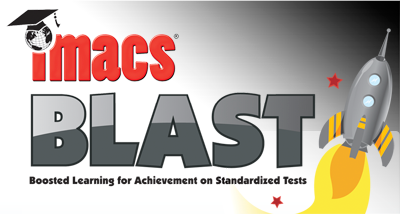
IMACS introduced Boosted Learning for Achievement on Standardized Tests (BLAST) in 2007 to help second graders who are struggling in math. After receiving a growing number of inquiries from parents searching for an effective remedial math program, we saw that it was time to make the benefits of our curriculum more widely available. IMACS is all about helping students reach their potential in math, and we firmly believe in this philosophy for all children regardless of natural ability.
BLAST, which is funded primarily through corporate sponsorship, is open to students who score below the 70th percentile in problem solving in first grade on the Stanford Achievement Test. Here are some highlights from our inaugural BLAST class:
• The average increase in math score across all students was 15 percentage points.
• Two-thirds of the students improved their math scores. The average increase among this group was 27 percentage points.
• Of the students who improved their math scores, more than half also improved their reading scores by an average of 19 percentage points.
• Every student in the bottom third of the class according to the first year’s math scores increased his or her math score. The average increase among this third was 29 percentage points.
• All but one of the students in the bottom third of the class according to the first year’s reading score increased their reading scores. The average increase among this third was 23 percentage points.
While our BLAST kids gained a lot from their IMACS experience, we were also able to take away some valuable lessons on how to help students who are having difficulty with math.
Learn to Think, THEN Think to Learn
Most children who come to us struggling with math have not sufficiently developed the ability to think logically and critically. And this is true whether they are below average or gifted and talented. Most have never been exposed to any kind of training in this area because the traditional approach to teaching is based on the assumption that logical reasoning and critical thinking skills will develop almost as a side benefit of studying the core subjects. It’s not quite putting the cart before the horse. Rather it’s more like having a stand-alone cart and hoping that a horse will trot on over to be attached. What we’ve found in both our BLAST program and in our advanced math program is that if you start children off by teaching them how to think logically, it makes a world of difference in their ability to learn whatever material comes after. And mathematical logic, like other subjects, can be taught and learned. It’s the intellectual equivalent of pumping iron in the gym when you’re training for competitive sports. Students first build up their critical thinking skills so that they are ready and, just as importantly, feel ready to be take on a challenging subject.
Individual Attention Encourages Risk-Taking
So how do we help students feel ready? It’s really just about rekindling and harnessing the natural curiosity they were born with. When a child is struggling with math, he or she may not feel comfortable speaking up in large group settings to answer questions or ask for help. Children with above average math abilities may feel the pressure of expectations. They may believe that they have to understand right away and cannot make mistakes. Those who are not naturally strong in math may fear being labeled as “dumb” if they give incorrect answers or admit that they don’t understand. They may also worry that others will think they are trying to “act smart” if they participate in class. At IMACS, we are able to break through this barrier of self-consciousness by working with children in small groups. When our students realize that they are in a place where it’s okay to take risks and make mistakes, they let down their guard and allow their natural curiosity take over. Simply put, they rediscover the joy of learning and leave the program feeling empowered to take on challenging work. A parent of one of our students summed it up beautifully: “BLAST went beyond my expectations. In a matter of 10 weeks, I have seen my child work with numbers on her free time and love math. Her self-esteem is soaring unbelievably.” That’s exactly the kind of feedback that makes us want to rise and shine each and every morning.
While we have our own in-house logic exercises that we use with our students, we’re also a big fan of logic games by ThinkFun. We like that ThinkFun games are affordable and constructed well to last a long time. And they usually have multiple levels of difficulty, which makes them accessible to a wider range of ages and abilities. Another great source are the weekly logic puzzles posted every Friday on our Facebook page. If you have a suggestion for other logic games or ways to help struggling students, please leave a comment.
If you are interested in being a corporate sponsor of BLAST, please send us an email at info @ eimacs.com.
IMACS online classes are designed to fit into your schedule. Take our free aptitude test to see if our program is right for you.









Leave a Reply